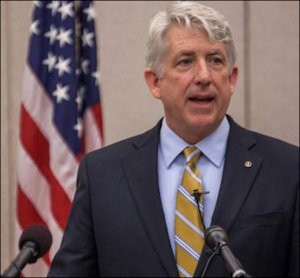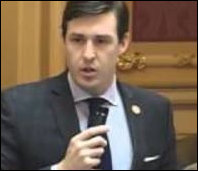The partisan battle lines are forming over the implementation of the Environmental Protection Agency’s Clean Power Plan, which calls for Virginia to reduce carbon dioxide emissions from state power plants 32% by 2030.
Attorney General Mark R. Herring, a Democrat, announced two weeks ago that Virginia will join a coalition of 17 other states supporting the Obama administration against a lawsuit filed by 24 other states. Foes of the plan argue that the EPA far exceeded its legislative authority in regulating CO2, and observers say the case could well reach the U.S. Supreme Court.
Meanwhile, Del. Israel O’Quinn, R-Washington, has introduced a bill that would require the General Assembly to approve and oversee implementation of the plan in Virginia. While the Clean Power Plan mandates CO2-reduction targets for each state, it allows each state to figure out how to achieve the goals.
Herring justified his support for the plan on the grounds that climate change “is a real and urgent threat to the health and safety of Virginians, our environment, and our economic success as a Commonwealth.” By way of specifics, he cited the threat of sea-level rise in Hampton Roads that could displace residents and businesses and threaten Naval Station Norfolk, and the prospect of extreme weather, droughts and floods. said Herring: “It’s long past time to acknowledge these realities and take decisive action.”
O’Quinn’s bill would require the Department of Environmental Quality (DEQ) to work in conjunction with the State Corporation Commission (SCC) to prepare a report assessing the plan’s effect on the Virginia’s electric power sector, electric customers, jobs, economic development, economic competitiveness, and state and local government.
The report also would identify new state laws that might be needed to implement the plan, study whether to rely upon EPA measures for calculating the CO2 reduction goal, and report on whether the Commonwealth should invest in energy efficiency programs, promote non-emitting nuclear power or participate in multistate programs. The report also would advanced recommendations on how best to avoid stranded investments in power plants that would be shuttered before they were fully paid off.
Getting answers to those questions is probably a good idea — the more information, the better — but sure to be controversial is the final item in the bill: “DEQ shall not submit to the EPA any state plan until both the Senate and the House of Delegates have adopted resolutions that approve the state plan in accordance with this act.”
It is safe to predict that the McAuliffe administration will not respond favorably to the idea of requiring the Republican-dominated General Assembly to approve the plan. Separation-of-power issues are potentially at stake here as well as ideological differences over climate change. Look for this to become a hot topic in the 2016 session.
— JAB




